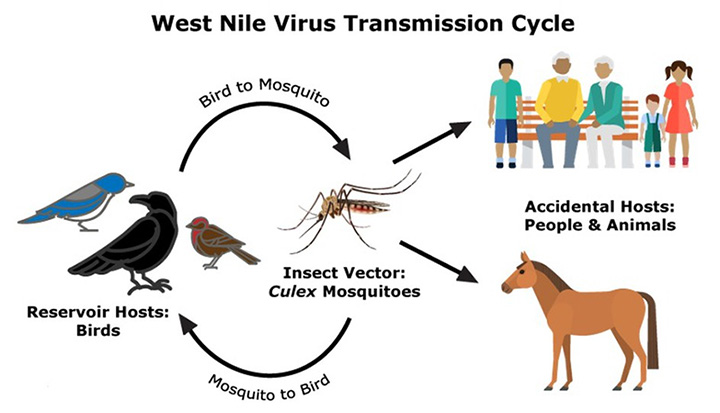Important Facts For Prelims
West Nile Virus Infections
- 31 Aug 2021
- 3 min read
Why in News
Recently, Russia warned of a possible increase in West Nile Virus (WNV) Infections this autumn as mild temperatures and heavy precipitation create favourable conditions for the mosquitos that carry it.
Key Points
- About:
- It is a member of the flavivirus genus and belongs to the Japanese encephalitis antigenic complex of the family Flaviviridae.
- WNV is commonly found in Africa, Europe, the Middle East, North America and West Asia.
- Older people, children and those with weakened immune systems are most at risk.
- Origin:
- WNV was first isolated in a woman in the West Nile district of Uganda in 1937.
- It was identified in birds in the Nile delta region in 1953. Before 1997, WNV was not considered pathogenic for birds.
- Human infections attributable to WNV have been reported in many countries for over 50 years.
- Transmission:
- WNV is an infectious disease spread by infected mosquitoes. It spreads from birds to humans with the bite of an infected Culex mosquito. It can lead to a fatal neurological disease in humans.
- The virus causes West Nile fever in around 20% of cases, according to the World Health Organization (WHO). It is related to the Zika, Dengue and Yellow Fever Viruses.
- Symptoms:
- Those infected usually have no symptoms or mild symptoms.
- The symptoms include a fever, headache, body aches, skin rash, and swollen lymph glands. They can last a few days to several weeks, and usually go away on their own.
- If West Nile virus enters the brain, it can be life-threatening. It may cause inflammation of the brain, called encephalitis, or inflammation of the tissue that surrounds the brain and spinal cord, called meningitis.
- Treatment:
- There are no specific vaccines or treatments for human WNV disease.
- The best way to avoid WNV is to prevent mosquito bites.
- Treatment is supportive for patients with neuro-invasive West Nile virus, often involving hospitalization, intravenous fluids, respiratory support, and prevention of secondary infections.





